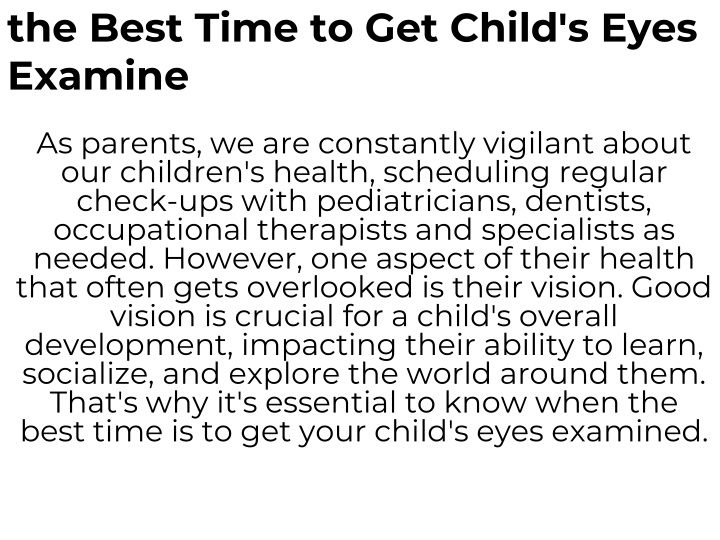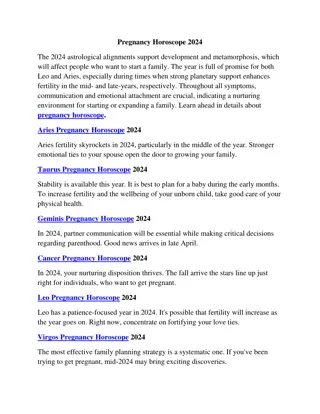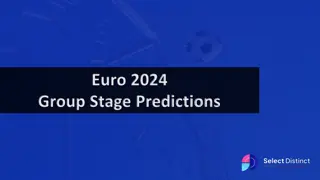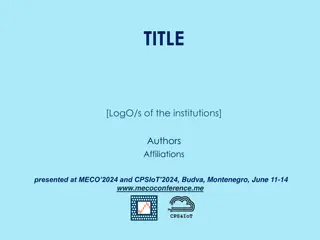When to Get Your Child's Eyes Examined for Optimal Health
Ensuring good vision in children is crucial for their overall development. Early detection through a comprehensive eye exam at 6-9 months can help identify potential issues like amblyopia and strabismus. Regular check-ups between ages 3-5 and before starting Kindergarten are recommended to monitor vision as children grow. Look out for signs like squinting, headaches, and eye rubbing, and consider scheduling exams at optimal times based on factors like age and routine.
Download Presentation

Please find below an Image/Link to download the presentation.
The content on the website is provided AS IS for your information and personal use only. It may not be sold, licensed, or shared on other websites without obtaining consent from the author.If you encounter any issues during the download, it is possible that the publisher has removed the file from their server.
You are allowed to download the files provided on this website for personal or commercial use, subject to the condition that they are used lawfully. All files are the property of their respective owners.
The content on the website is provided AS IS for your information and personal use only. It may not be sold, licensed, or shared on other websites without obtaining consent from the author.
E N D
Presentation Transcript
the Best Time to Get Child's Eyes Examine As parents, we are constantly vigilant about our children's health, scheduling regular check-ups with pediatricians, dentists, occupational therapists and specialists as needed. However, one aspect of their health that often gets overlooked is their vision. Good vision is crucial for a child's overall development, impacting their ability to learn, socialize, and explore the world around them. That's why it's essential to know when the best time is to get your child's eyes examined.
Early Detection is Key recommended that children receive their first comprehensive eye exam between the ages of 6 and 9 months. This initial exam is crucial for detecting any potential eye problems early on, even before a child can communicate about any vision issues they may be experiencing. "In addition to routine screening by a primary health care professional, a comprehensive eye examination by an individual with the expertise to detect risk factors for amblyopia such as an ophthalmologist or optometrist is required in early childhood. The findings support the importance of early detection of amblyopia before 36 months and no later than 48 months of age via screening with at least 1 comprehensive eye examination before age 5 years." assess child's visual development, eye movements, and overall eye health. While it's rare for infants to have significant vision problems, early detection of issues like lazy eye (amblyopia), crossed eyes (strabismus), or congenital cataract can lead to better treatment
Regular Check-ups as Child Grows After the initial eye exam at six months, it's recommended that children have another comprehensive eye exam between the ages of three and five. This is when many vision problems, such as nearsightedness (myopia), farsightedness (hyperopia), and astigmatism, may start to become apparent as the eyes continue to develop. Following this early childhood exam, children should have their eyes examined again before starting Kindergarten, around age five or six. Regular eye exams become especially important as children enter school because good vision is essential for success in the classroom. Undetected vision problems can lead to difficulties with reading, writing, and overall academic performance. To further increase the number of children who see an optometrist which focuses on getting all children in Kindergarten to see an eye doctor. In addition to these scheduled eye exams, parents
1.Squinting or closing one eye to see better 2.Holding books or screens very close to their face 3.Complaining of headaches or eye strain 4.Seeing an eye that drifts when their child is tired 5.Rubbing their eyes frequently 6.Avoiding activities that require visual concentration, such as reading or drawing
What's the Best Time of Day for An Eye Exam? depend on various factors, including their age, routine, and individual preferences. However, here are some considerations to help you choose the optimal time: 1. When They're Well-Rested: It's generally advisable to schedule an eye appointment when your child is well-rested and alert. Avoiding times when they're likely to be tired or cranky, such as late in the afternoon or close to naptime, can help ensure a smoother and more productive examination. 2. During Peak Alertness Hours: For most children, mornings tend to be a better time for appointments as they're typically more alert and attentive earlier in the day. Aim for appointments during mid-morning or late morning when your child is likely to be at their peak alertness. 3. Avoiding Hungry Times: Schedule the appointment after your child has had a meal or snack to avoid any potential hunger-related irritability during the examination. 4. Consider School Schedule: If your child is school-aged, schedule the appointment so they won't miss classes or activities. Some parents prefer booking appointments during school breaks or on weekends to minimize disruption to their child's academic schedule. Often, the best time of year to book kids' eye exams is during the summer break before school even starts. However, the bottom line is that if your child has vision issues, a one- hour eye exam may be the best investment, so don't delay. 5. Factors Specific to Your Child: Every child is unique, so consider their individual temperament and any factors that might affect their comfort during the examination. For example, if your child tends to be more cooperative in the afternoon or has specific sensory sensitivities, you may need to adjust the timing accordingly. Ultimately, the best time of day for your child's eye examination is one that fits well with their schedule and routine while considering their comfort and alertness levels. Prioritize scheduling the appointment at a time when both you and your child can be fully present and engaged, ensuring the most accurate assessment of their vision health. If you have any concerns or preferences, don't hesitate to discuss them with the eye care professional when scheduling the appointment.
The Importance of Yearly Eye Exams For Kids Once your child starts school, it's a good idea to schedule annual kids eye exams, especially if they don't require vision correction. Even if your child hasn't shown any signs of vision problems, regular check-ups are essential for monitoring their eye health and ensuring any issues are detected and addressed early. For children who wear glasses or contact lenses, annual exams ensure that their prescription is up to date and that their vision is adequately corrected. Children's eyes can change rapidly as they grow, so it's essential to keep their prescriptions current to prevent any potential issues. Your optometrist may also talk to you about specific myopia management treatments for nearsighted children to help reduce the magnitude of their prescription in the future.























